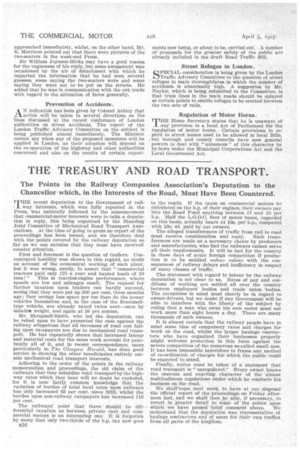THE TREASURY AND ROAD TRANSPORT.
Page 44

If you've noticed an error in this article please click here to report it so we can fix it.
The Points in the Railway Companies Association's Deputation to the Chancellor which, in the Interests of the Road, Must Have Been Countered.
TIME recent deputation to the Government of railI.. way interests, which was fully reported in the Press, was naturally followed by the announcement that con:u:nercial-motor interests were to take a deputation in reply, this being organized by the Standing Joint Committee of nechanical Road Transport Associations. At the time of going to press no report of the proceedings has been issued, and we therefore deal with the points covered by the railway deputation so far as we can surmise that they must have received counter attention.
First and foremost is the question of trailers. Concentrated hostility was shown in this regard, no doubt on account of the economical working of such plant, but it was wrong, surely, to assert that "commercial tractors paid only £25 a year and hauled loads of 20 tons! " This is traction-engine performance, where speeds are low and mileages small. The request for further taxation upon trailers can hardly succeed, seeing that they were put up 200 per cent, three months ago; they occupy less space per ton than do the power vehicles themaelves and, in the case of the Scaminelltype vehicle, are already taxed twice over—once by unlade% weight, and again at £6 per annum.
Mr. Shrapnell-Smith, who led the deputation, can be relied upon to have presented the case against the railway allegations that all increases of road cost falling upon ratepayers are due to mechanical road transport. He has repeatedly shown that increased labour and material costs for the same work account for practically all of it, and in recent correspondence, more particularly in The Glasgow Herald, has done good service in showing the other beneficiaries entirely outside mechanical road transport interests.
Adhering to the order of the points in the railway memorandum and proceedings, the old claim of the railways that they subsidize road transport by the highway rates which they bear will no doubt be exploded, for it Is now fairly common knowledge that the variation of burden of total local rates upon railways has only increased 63 per cent. since 1913, whilst the burden upon non-railway ratepayers has increased 116 per Cent.
The railways' point that there -should bedifferential taxation as between private cars and commercial motors is an interesting one It is forgotten by many that only two-thirds of the h.p. tax now goes B26
to the roads. If the taxes on commercial motors be calculated on the h.p. of their engines, their owners pay into the Road Fund anything between £1 and £5 per h.p. Half the L.G.O.C. fleet of motor buses, regarded on this basis, actually bears £4 10s. per h.p., compared with 13s. 4d. paid by car owners.
The alleged transferences of traffic from rail to road must receive consideration and reply. Such transferences are made as a necessary choice by producers and manufacturers, who find the railways cannot serve all their requirements. It will be bad for the country in these days of acute foreign competition if production is to be saddled nolens volens with the consequences of railway delays and inefficiency in respect of many classes of traffic.
Thestatement with regard to labour by the railway. deputation is not clear to us. Rates of pay and conditions of working are settled all over the country between employers' bodies and trade union bodies. The exeeptions in mind must clearly be in regard to owner-drivers, but we doubt if any Government will be able to interfere With the liberty of the subject by ruling that,a man who owns his own motor must not work more than eight hours a day. There are many thousands of such owners.
It is almost certain that the railway people have in mind some idea of compulsory rates and charges for work on the road, whilst the larger haulage contractors who have organized their businesses properly might welcome protection in this form against the severe competition of the numerous so-called small men. It has been impossible heretofore to frame any .method of co-ordination of charges for which the public could be expected to stand. • Finally, notice must be taken of a 'statement that road transport is "unregulated." Every owner knows the onerous and exacting character of the almost multitudinous regulations under which he. conducts his business on the road. .•
We shall'hope, -next week, to have at our ,dispOsal the official rePort of the proceedings. on Friday afternoon last, and we shall then be able, if necessary, to 'revert in .greater detail to some of the points upon whiCh we have passed brief comment above. We underStand that the deputation was representative of haulage contractors and of users for their own traffics from all parts of the kingdom. •






































































































